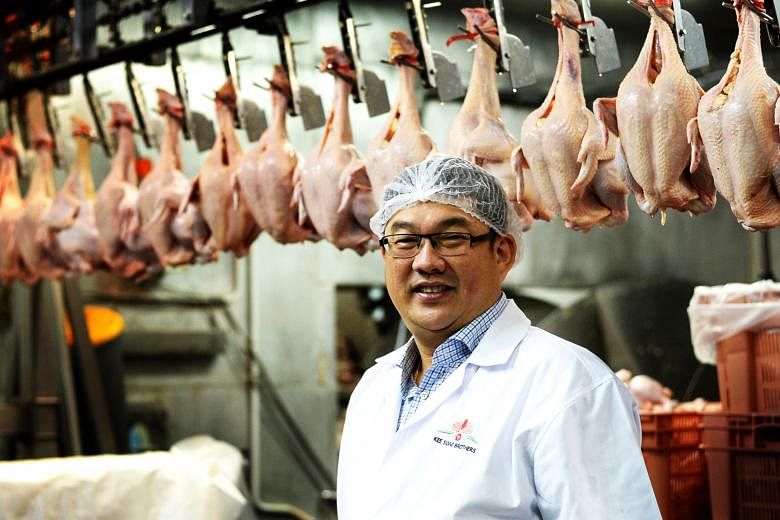Set to spread its wings with new home, ventures
Chicken farmer and processor Kee Song Brothers Poultry Industries runs its Defu Lane facility 24 hours a day in the lead-up to Chinese New Year, to cope with increased demand.
The company processes 40,000 to 50,000 chickens daily during the festive peak period, up from 25,000 on normal days, said managing director Ong Kian San.
Live chickens are transported to the facility by truck from the company's farms in Yong Peng in Malaysia. They are then processed and packed for delivery to supermarkets, hotels and restaurants here.
The company is known for pioneering an antibiotic-free approach to rearing fowl.
Chickens at its farms are fed food and water infused with Lactobacillus, a type of "good" bacteria that boosts the immune system. This regimen removes the need for drugs and chemicals in the farming process.
The use of antibiotics in agriculture is unsustainable due to the rise of antibiotic resistance, said Mr Ong, who has been involved in the family business since he was a boy in primary school.
Kee Song sells its antibiotic-free chickens under the Imperial Cordyceps and CaroGold labels. The company is also behind the Sakura Chicken sold exclusively at FairPrice supermarkets.
About 35 per cent of the chickens it produces are antibiotic-free - a share that Mr Ong hopes to increase over time, despite the higher costs involved. "This is the way to go in the long term," said Mr Ong, who was speaking in Mandarin.
A few years ago, Kee Song expanded into growing vegetables. The chickens' droppings, which contain traces of Lactobacillus, are used as fertiliser - doing away with the need for chemical pesticides.
The company is preparing to moveing to a new home even while it ventures into other business areas. Kee Song will join four other similar companies in setting up shop at a new poultry-processing hub, designed in conjunction with industrial landlord JTC and expected to be ready in 2018.
"The new facility will have the latest machines and be a lot more efficient," Mr Ong said.
The company moved into its Defu Lane premises in 1989 and automated the facility in 1992.
Mr Leong Hong Yew, director of JTC's food and lifestyle cluster, said: "We are aware of challenges faced by poultry suppliers in Singapore, and their drive to become more productive and efficient.
"Hence, we are working closely with them and the Poultry Merchants' Association to design and develop a dedicated facility to house poultry suppliers and enable them to implement more automated and productive poultry-processing technologies."


